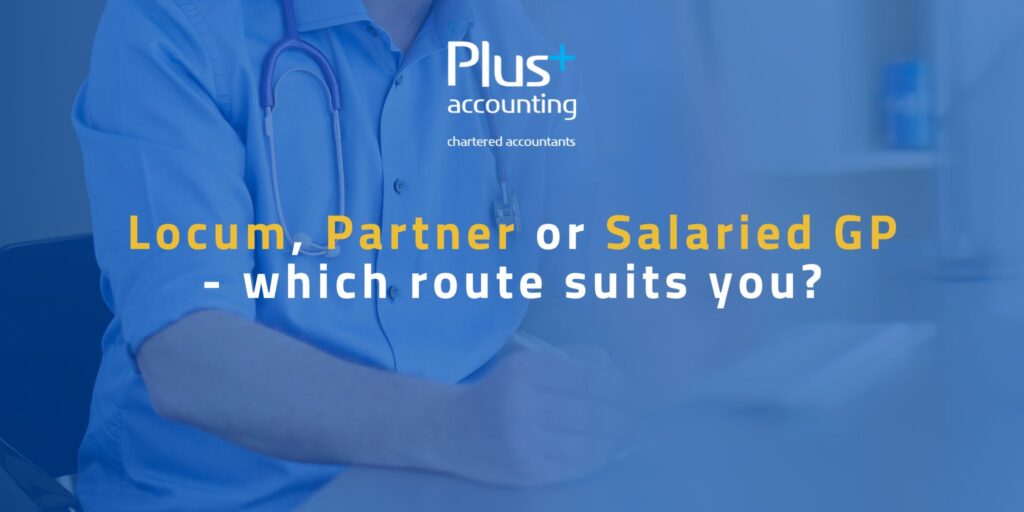Choosing how to work in general practice is one of the biggest decisions a GP will make in their career. Each route, salaried GP, GP partner or locum (freelancer), brings different financial, administrative and lifestyle implications. The right choice depends on your priorities: security and benefits, higher take-home pay, flexibility, or owning and shaping a practice.
This guide explains the key differences, highlights tax and accounting considerations, and shows how tailored management accounts, forecasting and cloud accounting can help you make the most of whichever path you take.
Quick overview: three employment models
Salaried GP
- Employed by a practice on a salary and (usually) a pension scheme.
- Predictable pay and statutory benefits (holiday, sick pay, employer pension contributions).
- Less administrative responsibility — the practice handles payroll, PAYE and many compliance tasks.
GP Partner
- Part-owner of the practice (typically through a partnership).
- Shared profits rather than salary — potential for higher overall rewards long-term.
- Responsible for practice management decisions, payroll obligations, VAT, pension scheme administration and regulatory/compliance risk.
Locum (freelance) GP
- Self-employed or engaged via an agency/umbrella. Highly flexible — work when and where you choose.
- Variable income: ability to earn a higher hourly/daily rate, but no employee benefits.
- Greater responsibility for tax, NICs, pension planning, and record-keeping.
Financial and tax implications (what to consider)
Income stability & cash flow
- Salaried GPs benefit from reliable monthly pay.
- Partners and locums need robust cash-flow planning to cope with fluctuations in income and periodic tax liabilities. Management accounts and rolling cashflow forecasts are essential tools here.
Tax structure
- Salaried GPs: taxed under PAYE; employer handles PAYE/NICs.
- Partners: taxed on the profits of the practice (self-assessment). Partners must plan for income tax, Class 2/4 NICs and practical timing of drawings.
- Locums: often operate as sole traders or via a limited company. Each structure has different tax, NIC and administrative consequences. Choosing the right one depends on earnings level, plans to employ others, and longer-term objectives.
Pensions
- Partners and salaried GPs may participate in NHS pension arrangements (or other occupational schemes) with employer contributions — a key benefit to factor in.
- Locums must arrange their own pension provision (private pensions or personal pension plans) and consider the long-term value of employer pension contributions.
VAT
- Many NHS-funded medical services are VAT-exempt, meaning practices can’t charge VAT on those services. VAT recovery and registration can therefore be complex. If your practice supplies taxable services (e.g. certain private services), VAT registration and partial exemption rules may apply. We recommend a specialist VAT review before making any assumptions.
Employment status & IR35
- Locums engaged via intermediaries or umbrella companies should be mindful of off-payroll rules in particular circumstances. Employment status affects tax and NICs — always get tailored advice for your contracting arrangements.
Practical accounting & compliance needs
No matter which route you choose, good financial systems are non-negotiable. These are the areas where accountants make a tangible difference:
1. Management accounts & KPIs
Regular, clear management accounts give you a snapshot of profitability, cash runway and where to reduce cost or re-invest. For partners, this also supports decisions around drawings, reserves and capital expenditure.
2. Forecasting & cash-flow modelling
Monthly/quarterly cash-flow forecasts help partners and locums plan for tax payments, pension contributions and quieter periods. Scenario modelling (best/worst/expected case) is particularly useful for locums and partnerships that face seasonal swings.
3. Cloud accounting & automation
Using Xero (or similar) with receipt capture tools (e.g. Dext) and fast payments (e.g. Telleroo) saves time and reduces errors. Cloud systems make it much easier to produce up-to-date management information, wherever you are working.
4. Payroll & auto-enrolment
If you employ staff (receptionists, nurses, practice managers), payroll and auto-enrolment duties can be time consuming. Outsourcing payroll ensures you stay compliant and free to focus on patient care.
5. VAT and statutory filing
From VAT partial exemption to MTD obligations and annual accounts, compliance is technical and can be punitive if handled incorrectly. Specialist advice keeps you safe and tax-efficient.
Which route could work best — practical prompts
Use these prompts to help decide your next step:
- Do you prioritise predictable income and less admin? Consider salaried roles.
- Want more control, potential upside and a stake in decision-making? Partnership might suit you. Be prepared for management responsibilities.
- Need flexibility and variety? Locuming gives freedom, but plan for tax volatility and arrange pensions and insurance.
How Plus Accounting can help GPs and practices
We specialise in supporting healthcare professionals and practices with finance that’s practical and tailored to clinical life. Our services include:
- Management accounts and KPI dashboards designed for practices and locums.
- Cash-flow forecasting and scenario planning for practice owners and contractors.
- Cloud accounting setup (Xero) with Dext/Telleroo integrations to automate routine tasks.
- VAT reviews for mixed private/NHS income and partial exemption advice.
- Payroll, auto-enrolment and employer NIC planning.
- Tax planning, pension modelling and business structure advice (sole trader vs limited vs partnership).
- Support throughout practice transitions — mergers, partner exits, buying/selling practices.
We work closely with practice managers, partners and contractors to make finance simple and actionable — so clinicians can focus on patients, not paperwork.
Want help choosing the right route?
Contact Emma Hardwick at Plus Accounting for a friendly, practical conversation about your options and a bespoke plan to secure your financial future.
Author: Emma Hardwick, Outsourcing Service Director, Plus Accounting
Any views or opinions represented in this blog are personal, belong solely to the blog owner and do not represent those of Plus Accounting. All content provided on this blog is for informational purposes only. The owner of this blog makes no representations as to the accuracy or completeness of any information on this site or found by following any link on this site. Please note that AI has been utilised in generating content for this blog.
Date Published: 22 September 2025



